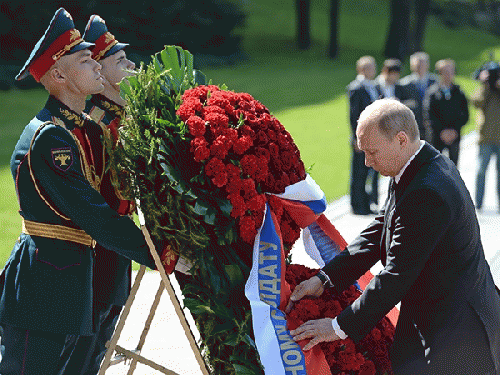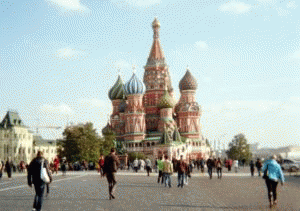From Consortium News

Russian President Vladimir Putin laying a wreath at Russia's Tomb of the Unknown Soldier on May 8, 2014, as part of the observance of the World War II Victory over Germany.
(Image by Foto, ru) Details DMCA
In February, the Obama administration announced that it was quadrupling funding for a major increase in NATO troops and weaponry in the countries of Eastern Europe on the border with Russia. Diplomatic relations have faltered between the two countries over Syria.
And the corporate media in the U.S. and U.K. have again stepped up their demonization of all things Vladimir Putin -- he's corrupt, he personally orders hits on people, is facilitating war crimes in Aleppo, and wants to invade Europe. The media also pushes the idea that Russia is an uncivilized and backwards cesspit.
Considering that Russia is a nuclear superpower, the largest country geographically in the world, and is the sixth largest economy in terms of purchasing power parity (and projected to be number six in 2021 in terms of GDP), the U.S. relationship with Russia is one of the most important and delicate.
In order to have any chance of conducting this relationship in a rational manner, an accurate and nuanced understanding of the country itself and the history of post-Soviet U.S.-Russia relations is essential. This requires cutting through the misinformation and distortion that saturates much of our mainstream news and political discourse.
It's important to keep in mind that Russia has a 1,000-year history of authoritarian rule and only started its climb-out in the late 1980s. It is a transitional society, with elements of both authoritarianism and democracy. Putin, along with Dmitri Medvedev and Mikhail Gorbachev, is the least authoritarian leader that Russia has ever had.
Considering that the U.S. has supposedly been an established democracy for over 200 years, we Americans should consider a few significant problems we still have in order to gain some perspective. Only 55 years ago, African-Americans could not vote and could even be murdered with impunity in many parts of the country.
Today, we have an epidemic of militarized police officers who are shooting first and asking questions later; more and more people on death row are turning out to be innocent; rising inequality threatens our stability; and, a system of deep corruption in terms of campaign financing has compromised our democracy -- corruption that is so profound that two political science academics have recently quantified the ways in which we are now officially an oligarchy.
Is this any better than Russia's corruption because it has been folded into our legal system? We certainly have our own "oligarchs" in the form of the Koch brothers, Bill Gates, and the Walton family. Perhaps we can concede that it's not very useful to beat on Russia for not being Switzerland after only 25 years.
Russian Sentiment
A recent poll by the independent Levada Center revealed that 66 percent of Russians feel free and 68 percent don't believe it is likely that Russia will revert back to dictatorship. To understand why Russians may see themselves as fairly free, it is important to understand not only their history of authoritarian rule but also some facts and observations about Russia that run counter to the narrative often presented in our mainstream corporate media, which is owned by those same oligarchs that have captured our political system.
When I visited Russia last autumn, one of the first things I observed was that the police in both Moscow and St. Petersburg did not carry guns, only batons. I asked some Russians about this and was told that if an officer had a special assignment, he/she might carry a gun but that generally they did not. This is not consistent with the characterization that most Americans have about Russia being a police state or autocracy.
Speaking of guns, Russian citizens have to abide by much stricter gun control laws than in the U.S. These include the requirement for gun owners to obtain a five-year renewable license. Before the first license is issued, attendance in a firearms safety class and the passing of a federal safety exam is required as well as a background check.
One example of how the Russian gun control laws have helped to prevent the deadly types of mass shootings seen in the U.S. is the hate crime against patrons of a gay club in Yekaterinburg that occurred shortly after the Orlando massacre. Due to the fact that Russians don't easily have access to (illegal) assault weapons, no deaths occurred as a consequence of the violence perpetrated against the patrons by a group of Russian hoodlums who only had small, pneumatic weapons.
Next Page 1 | 2 | 3 | 4 | 5 | 6 | 7 | 8
(Note: You can view every article as one long page if you sign up as an Advocate Member, or higher).






